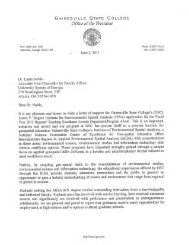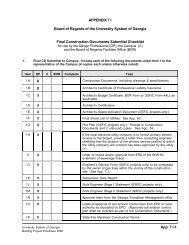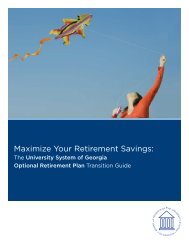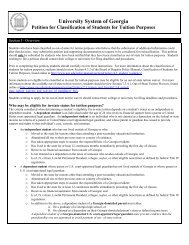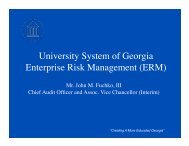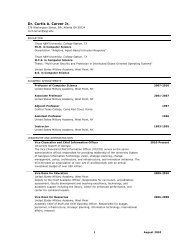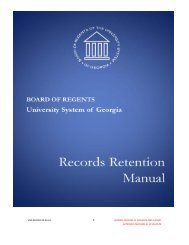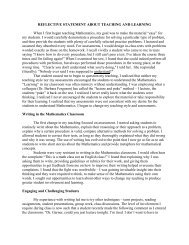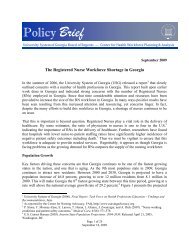WReier-Aviles on DSKGBLS3C1PROD with RULES266876 Federal Register / Vol. 75, No. 209 / Friday, October 29, 2010 / Rules and Regulationsadjustments, including whether raises(for promotions) would be permittedand whether reductions (for demotions)would be permitted. Some commentersrequested clarification on whether asalary could be paid. One commenterasked whether benefits could be paid atdifferential rates by class <strong>of</strong> employee oron a sliding scale by salary.Discussion: Based on these comments,the Secretary agrees that somemodifications to the language inproposed § 668.14(b)(22) would behelpful to ensure that incentivepayments are not based ‘‘in any part’’ onsuccess in securing enrollments orfinancial aid. In particular, we agree thatit is appropriate to add language toavoid confusion as to whether some part<strong>of</strong> an individual’s compensation may bebased on incentive compensation. Forthis reason, we are revising§ 668.14(b)(22)(i) to reinforce the ideathat compensation must not be based inany part, directly or indirectly, onsuccess in securing enrollments or theaward <strong>of</strong> financial aid.In addition, we support revising theregulations to provide that an employeewho receives multiple compensationadjustments in a calendar year isconsidered to have received adjustmentsbased upon success in securingenrollments or the award <strong>of</strong> financialaid in violation <strong>of</strong> the incentivecompensation ban in § 668.14(b)(22) ifthose adjustments create compensationthat is based in any part, directly orindirectly, upon success in securingenrollments or the award <strong>of</strong> financialaid.Finally, with respect to the requestsfor clarification on allowable salaryadjustments, we note that individualsmay be compensated in any fashion thatis consistent with the prohibitionidentified in section 487(a)(20) <strong>of</strong> theHEA. Accordingly, while notcommenting on any specificcompensation structure that aninstitution may choose to implement,the <strong>Department</strong> recognizes, for example,that institutions <strong>of</strong>ten maintain ahierarchy <strong>of</strong> recruitment personnel withdifferent amounts <strong>of</strong> responsibility. Aslong as an institution complies withsection 487(a)(20) <strong>of</strong> the HEA, it may beappropriate for an institution to havesalary scales that reflect an addedamount <strong>of</strong> responsibility. Institutionsalso remain free to promote and demoterecruitment personnel, as long as thesedecisions are consistent with the HEA’sprohibition on the payment <strong>of</strong> incentivecompensation. Finally, it is appropriateto pay recruitment personnel a fixedsalary.Changes: We have revised§ 668.14(b)(22)(i)(A) (which has beenredesignated as § 668.14(b)(22)(i)) toclarify that a prohibited incentivecompensation includes anycommission, bonus, or other incentivepayment based in any part, directly orindirectly, upon success in securingenrollments or the award <strong>of</strong> financialaid to any person or entity engaged inany student recruitment or admissionactivity or in making decisionsregarding the award <strong>of</strong> title IV, HEAprogram funds.In addition, we have redesignatedproposed § 668.14(b)(22)(i)(B) as§ 668.14(b)(22)(i)(A) and added a newparagraph (b)(22)(i)(B) to provide that,for the purposes <strong>of</strong> this paragraph, anemployee who receives multipleadjustments to compensation in acalendar year and is engaged in anystudent enrollment or admissionactivity or in making decisionsregarding the award <strong>of</strong> title IV, HEAprogram funds is considered to havereceived such adjustments based uponsuccess in securing enrollments or theaward <strong>of</strong> financial aid if thoseadjustments create compensation that isbased in any part, directly or indirectly,upon success in securing enrollments orthe award <strong>of</strong> financial aid.Finally, we have revised§ 668.14(b)(22)(ii) to provide thateligible institutions, organizations thatare contractors to eligible institutions,and other entities may make merit-basedadjustments to employee compensationprovided that such adjustments are notbased in any part, directly or indirectly,upon success in securing enrollments orthe award <strong>of</strong> financial aid.Comment: Commenters raised anumber <strong>of</strong> questions related to the twoparttest the <strong>Department</strong> has <strong>of</strong>fered thatwill demonstrate whether acompensation plan or paymentcomplies with the statute and theimplementing regulations. Manycommenters seemed confused about theapplication <strong>of</strong> the two-part test andraised a wide range <strong>of</strong> specific questionsabout employment possibilities andcompensation practices. For example,some commenters asked for clarificationabout the types <strong>of</strong> items that could beconsidered something <strong>of</strong> value, such asletters <strong>of</strong> recommendation to volunteerinterns.Several commenters asked that weinclude the language <strong>of</strong> the two-part testin the regulatory text.Finally, one commenter asserted thatthe two-part test will not add clarity oncompensation issues but instead willraise questions about the legality <strong>of</strong>certain types <strong>of</strong> merit-basedcompensation systems that seem to falloutside the scope <strong>of</strong> compensationVerDate Mar2010 14:10 Oct 28, 2010 Jkt 223001 PO 00000 Frm 00046 Fmt 4701 Sfmt 4700 E:\FR\FM\29OCR2.SGM 29OCR2restriction but that could fail to satisfythe two-part test.Discussion: As discussed earlier inthis preamble, the <strong>Department</strong> hasdescribed a two-part test for evaluatingwhether a payment constitutes acommission, bonus, or other incentivepayment based in any part, directly orindirectly, upon success in securingenrollments or the award <strong>of</strong> financialaid to any person or entity engaged inany student recruitment or admissionactivity or in making decisionsregarding the award <strong>of</strong> title IV, HEAprogram aid in violation <strong>of</strong> the banreflected in § 668.14(b)(22)(i). The<strong>Department</strong> first described this test inthe preamble to NPRM. (See 75 FR34818 (June 18, 2010).) The test consists<strong>of</strong> the following two questions, theanswers to which will permit aninstitution to know whether thecompensation is considered incentivecompensation:(1) Whether the payment is acommission, bonus, or other incentivepayment, defined as an award <strong>of</strong> a sum<strong>of</strong> money or something <strong>of</strong> value paid toor given to a person or entity forservices rendered; and(2) Whether the commission, bonus,or other incentive payment is providedto any person based in any part, directlyor indirectly, upon success in securingenrollments or the award <strong>of</strong> financialaid, which are defined as activitiesengaged in for the purpose <strong>of</strong> theadmission or matriculation <strong>of</strong> studentsfor any period <strong>of</strong> time or the award <strong>of</strong>financial aid.If the answer to each <strong>of</strong> thesequestions is yes, the payment would notbe permitted under section 487(a)(20) <strong>of</strong>the HEA or § 668.14(b)(22). The<strong>Department</strong> merely provided this test asa tool to help institutions evaluatecompensation practices they mayconsider implementing. The test doesnot add any substantive requirementsthat are not otherwise included in§ 668.14(b)(22)(i). For this reason, we donot think it is necessary or appropriateto include the text <strong>of</strong> the test in theregulations.The <strong>Department</strong> further notes that, asa general matter, it does not believe thatthe provision <strong>of</strong> letters <strong>of</strong>recommendation to volunteer internswould constitute a proscribed incentivepayment.Finally, we disagree with thecomment that the two-part test will notserve generally to answer institutions’questions regarding a particularcompensation plan. As previouslystated, we believe that the prohibitionidentified in section 487(a)(20) <strong>of</strong> theHEA is clear and that institutionsshould not have difficulty maintaining
Federal Register / Vol. 75, No. 209 / Friday, October 29, 2010 / Rules and Regulations66877WReier-Aviles on DSKGBLS3C1PROD with RULES2compliance with the new regulatorylanguage. To the extent an institutionhas questions about what it intends todo, the <strong>Department</strong> has <strong>of</strong>fered the twoparttest as an aid to reaching a properconclusion. To the extent that aninstitution does not wish to use the testto assist it in evaluating its practices, itis not required to do so.Changes: None.Comment: A number <strong>of</strong> commentersquestioned the use <strong>of</strong> the term‘‘indirectly’’ in the prohibition onincentive compensation in proposed§ 668.14(b)(22). They expressed concernabout the broad scope <strong>of</strong> this term andbelieved that interpretive discord willresult from its inclusion in§ 668.14(b)(22). These commentersargued that any compensation involvingan institution <strong>of</strong> higher education isbased indirectly on success in securingenrollments and asked how far removedan activity must be in order for it not tobe considered indirectly related. Othercommenters specifically requested thatwe define the term ‘‘indirectly.’’Several commenters suggested thatproposed § 668.14(b)(22)(i)(A) shoulduse the term ‘‘solely’’ rather than‘‘directly or indirectly’’ (i.e., ‘‘it will notprovide any commission, bonus, orother incentive payment based solelyupon success’’ rather than ‘‘it will notprovide any commission, bonus, orother incentive payment based directlyor indirectly upon success’’). These andother commenters alleged that thelanguage in proposed§ 668.14(b)(22)(i)(A) is not consistentwith congressional intent. Many <strong>of</strong> thesecommenters cited to the conferencereport, which states that the use <strong>of</strong> theterm ‘‘indirectly’’ does not mean thatinstitutions are prohibited from basingsalaries on merit; they may not,however, be based ‘‘solely’’ on thenumber <strong>of</strong> students recruited, admitted,enrolled, or awarded.Discussion: The <strong>Department</strong> does notagree with the view that the use <strong>of</strong> thephrase ‘‘directly or indirectly’’ will leadto interpretation problems or that it isinconsistent with congressional intent.Given the <strong>Department</strong>’s experience withhow the safe harbor in current§ 668.14(b)(22)(i)(A), which permits upto two salary adjustments per yearprovided that they are not based solelyon the number <strong>of</strong> students recruited,admitted, enrolled, or awarded financialaid, has been abused, the <strong>Department</strong>does not believe that it servescongressional intent to limit theincentive compensation ban in section487(a)(20) <strong>of</strong> the HEA to those paymentsthat are based solely upon success insecuring enrollments or the award <strong>of</strong>financial aid. The <strong>Department</strong> believesthat, consistent with section 487(a)(20)<strong>of</strong> the HEA, incentive payments shouldnot be based in any part, directly orindirectly, on success in securingenrollments or the award <strong>of</strong> financialaid.The safe harbor in current§ 668.14(b)(22)(i)(A) has led toallegations in which institutionsconceded that their compensationstructures included consideration <strong>of</strong> thenumber <strong>of</strong> enrolled students, butaverred that they were not solely basedupon such numbers. In some <strong>of</strong> theseinstances, the substantial weight <strong>of</strong> theevidence suggested that the other factorspurportedly analyzed were not trulyconsidered, and that, in reality, theinstitution based salaries exclusivelyupon the number <strong>of</strong> students enrolled.After careful consideration, the<strong>Department</strong> determined that removal <strong>of</strong>the safe harbor was preferable toretaining but revising the safe harbor.For example, we considered suggestionsthat we change the word solely to someother modifier, such as ‘‘primarily’’ or‘‘substantially,’’ but ultimatelydetermined that doing so would notcorrect the problem. With such achange, we believe the evaluation <strong>of</strong> anyalternative arrangement would merelyshift to whether the compensation was‘‘primarily’’ or ‘‘substantially’’ basedupon enrollments. Such a shift wouldnot reduce the ability <strong>of</strong> anunscrupulous actor to claim that studentenrollments constituted this lesserfactor within a recruiter’s evaluationand would foster the same sorts <strong>of</strong>abuses that have become apparent byinstitutions attempting to assert thattheir compensation practices are notsolely based on enrollments.Changes: None.Comment: A number <strong>of</strong> commentersraised questions about proposed§ 668.14(b)(22)(ii), which allows eligibleinstitutions, organizations that arecontractors to eligible institutions, andother entities to make merit-basedadjustments to employee compensationprovided that such adjustments are notbased upon success in securingenrollments or the award <strong>of</strong> financialaid. They expressed concern thatlimiting merit-based adjustments tothose that are not based upon success insecuring enrollments or the award <strong>of</strong>financial aid would make it impossiblefor them to award merit increases foremployees whose job it is to enrollstudents. They noted that there are nostandard evaluative factors concerningenrollment that are not directly orindirectly based on securingenrollments.Some commenters requestedclarification about whether an increaseVerDate Mar2010 14:10 Oct 28, 2010 Jkt 223001 PO 00000 Frm 00047 Fmt 4701 Sfmt 4700 E:\FR\FM\29OCR2.SGM 29OCR2could be based on seniority or length <strong>of</strong>employment, including whether aretention bonus could be paid based onthe employee’s retention at theinstitution if it is paid evenly to allemployees.Some commenters argued that theregulations should recognize and permitcompensation based on the performance<strong>of</strong>, and success at, the core job functions<strong>of</strong> admissions representatives andfinancial aid <strong>of</strong>ficials. They questionedhow it would be possible to measureemployee performance withoutevaluating success. They asked that weprovide concrete guidance about howinstitutions can make salaryadjustments without violating theincentive compensation prohibition.Discussion: Section 668.14(b)(22)does not prohibit merit-basedcompensation for financial aid oradmissions staff. An institution may usea variety <strong>of</strong> standard evaluative factorsas the basis for this type <strong>of</strong>compensation; however, consistent withsection 487(a)(20) <strong>of</strong> the HEA and§ 668.14(b)(22), an institution may notconsider the employee’s success insecuring student enrollments or theaward <strong>of</strong> financial aid in providing thistype <strong>of</strong> compensation. Further, anincrease in compensation that is basedin any part either directly or indirectlyon the number <strong>of</strong> students recruited orawarded financial aid is prohibited.As previously mentioned, manyinstitutions currently claim to evaluatetheir recruitment personnel on a series<strong>of</strong> qualitative factors, as well as on thenumber <strong>of</strong> enrolled students, todemonstrate compliance with the safeharbor reflected in current§ 668.14(b)(22)(i)(A), which prohibitscompensation based solely on thenumber <strong>of</strong> students enrolled. As aresult, it appears that these institutionshave identified other factors that are notdependent upon student enrollmentsthat we believe could by themselves beconsidered for making a merit-basedcompensation decision. In addition,seniority or length <strong>of</strong> employment is anappropriate basis for making acompensation decision separate andapart from any consideration <strong>of</strong> thenumbers <strong>of</strong> students enrolled. Finally,as many commenters from groupsrepresenting admissions personnelnoted, as a general matter, recruitmentpersonnel should be compensated witha fixed salary to ensure that their abilityto focus on what is in a student’s bestinterest is not compromised.Changes: None.Comment: Several commenters raisedissues about the relationship between aninstitution’s goals and payments toemployees. Many asked whether
- Page 1 and 2: Friday,October 29, 2010Part IIDepar
- Page 3 and 4: Federal Register / Vol. 75, No. 209
- Page 6 and 7: 66836 Federal Register / Vol. 75, N
- Page 8 and 9: 66838 Federal Register / Vol. 75, N
- Page 10 and 11: WReier-Aviles on DSKGBLS3C1PROD wit
- Page 12 and 13: 66842 Federal Register / Vol. 75, N
- Page 14 and 15: 66844 Federal Register / Vol. 75, N
- Page 16 and 17: WReier-Aviles on DSKGBLS3C1PROD wit
- Page 18 and 19: 66848 Federal Register / Vol. 75, N
- Page 20 and 21: 66850 Federal Register / Vol. 75, N
- Page 22 and 23: WReier-Aviles on DSKGBLS3C1PROD wit
- Page 24 and 25: 66854 Federal Register / Vol. 75, N
- Page 26 and 27: WReier-Aviles on DSKGBLS3C1PROD wit
- Page 28 and 29: 66858 Federal Register / Vol. 75, N
- Page 30 and 31: 66860 Federal Register / Vol. 75, N
- Page 32 and 33: 66862 Federal Register / Vol. 75, N
- Page 34 and 35: 66864 Federal Register / Vol. 75, N
- Page 36 and 37: 66866 Federal Register / Vol. 75, N
- Page 38 and 39: WReier-Aviles on DSKGBLS3C1PROD wit
- Page 40 and 41: WReier-Aviles on DSKGBLS3C1PROD wit
- Page 42 and 43: 66872 Federal Register / Vol. 75, N
- Page 44 and 45: WReier-Aviles on DSKGBLS3C1PROD wit
- Page 48 and 49: WReier-Aviles on DSKGBLS3C1PROD wit
- Page 50 and 51: 66880 Federal Register / Vol. 75, N
- Page 52 and 53: WReier-Aviles on DSKGBLS3C1PROD wit
- Page 54 and 55: 66884 Federal Register / Vol. 75, N
- Page 56 and 57: 66886 Federal Register / Vol. 75, N
- Page 58 and 59: WReier-Aviles on DSKGBLS3C1PROD wit
- Page 60 and 61: WReier-Aviles on DSKGBLS3C1PROD wit
- Page 62 and 63: WReier-Aviles on DSKGBLS3C1PROD wit
- Page 64 and 65: WReier-Aviles on DSKGBLS3C1PROD wit
- Page 66 and 67: WReier-Aviles on DSKGBLS3C1PROD wit
- Page 68 and 69: WReier-Aviles on DSKGBLS3C1PROD wit
- Page 70 and 71: WReier-Aviles on DSKGBLS3C1PROD wit
- Page 72 and 73: 66902 Federal Register / Vol. 75, N
- Page 74 and 75: WReier-Aviles on DSKGBLS3C1PROD wit
- Page 76 and 77: WReier-Aviles on DSKGBLS3C1PROD wit
- Page 78 and 79: 66908 Federal Register / Vol. 75, N
- Page 80 and 81: WReier-Aviles on DSKGBLS3C1PROD wit
- Page 82 and 83: 66912 Federal Register / Vol. 75, N
- Page 84 and 85: WReier-Aviles on DSKGBLS3C1PROD wit
- Page 86 and 87: 66916 Federal Register / Vol. 75, N
- Page 88 and 89: WReier-Aviles on DSKGBLS3C1PROD wit
- Page 90 and 91: WReier-Aviles on DSKGBLS3C1PROD wit
- Page 92 and 93: WReier-Aviles on DSKGBLS3C1PROD wit
- Page 94 and 95: 66924 Federal Register / Vol. 75, N
- Page 96 and 97:
WReier-Aviles on DSKGBLS3C1PROD wit
- Page 98 and 99:
66928 Federal Register / Vol. 75, N
- Page 100 and 101:
WReier-Aviles on DSKGBLS3C1PROD wit
- Page 102 and 103:
66932 Federal Register / Vol. 75, N
- Page 104 and 105:
WReier-Aviles on DSKGBLS3C1PROD wit
- Page 106 and 107:
66936 Federal Register / Vol. 75, N
- Page 108 and 109:
66938 Federal Register / Vol. 75, N
- Page 110 and 111:
66940 Federal Register / Vol. 75, N
- Page 112 and 113:
66942 Federal Register / Vol. 75, N
- Page 114 and 115:
66944 Federal Register / Vol. 75, N
- Page 116 and 117:
66946 Federal Register / Vol. 75, N
- Page 118 and 119:
WReier-Aviles on DSKGBLS3C1PROD wit
- Page 120 and 121:
WReier-Aviles on DSKGBLS3C1PROD wit
- Page 122 and 123:
WReier-Aviles on DSKGBLS3C1PROD wit
- Page 124 and 125:
66954 Federal Register / Vol. 75, N
- Page 126 and 127:
WReier-Aviles on DSKGBLS3C1PROD wit
- Page 128 and 129:
66958 Federal Register / Vol. 75, N
- Page 130 and 131:
66960 Federal Register / Vol. 75, N
- Page 132 and 133:
WReier-Aviles on DSKGBLS3C1PROD wit
- Page 134 and 135:
WReier-Aviles on DSKGBLS3C1PROD wit
- Page 136 and 137:
WReier-Aviles on DSKGBLS3C1PROD wit
- Page 138 and 139:
66968 Federal Register / Vol. 75, N
- Page 140 and 141:
66970 Federal Register / Vol. 75, N
- Page 142 and 143:
66972 Federal Register / Vol. 75, N
- Page 144 and 145:
66974 Federal Register / Vol. 75, N



